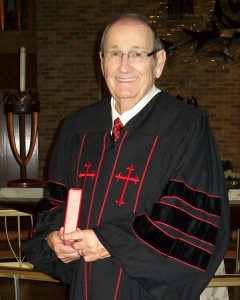
I went into a pet store the other day just to look around. I came out with a small aquarium and one fish. I picked out a lively purple-ish 3-inch fish because it was beautiful and I’d never seen one like it. I asked if I could put a gold fish in the water with him. They told me that he is a king Siamese fighting fish and that he would kill any fish in the aquarium with him. I didn’t think much about it, but on the way home, I asked myself, “What am I doing with a killer fish anyway?” I named him King Tut, for some reason. I believe this is a modern parable.
Fish, humans, or whatever, there is a similar problem in the world today. An old coal miner prayed, “Lord, if you’ve read the papers this week, you know what a big mess we’re in.” One evening, I wanted on television the refugees trekking across Europe and other places. Can life be a bigger “mess” than that? Women, children, old people and babies in the arms of weary mothers, all making a sad tapestry of human suffering. Bodies of desperate people leaving their homeland to escape an evil leader who kills his own people wash up on the shore.
Yes, there seems to be a messy situation in most places. But we can be thankful in spite of it all. Be grateful that you were born where you are. Be thankful if you are getting along with your spouse and children—the folks in your “aquarium”. Give thanks for the ability to love another human being without condition. Be everlastingly grateful for a country that won’t bomb your home and force you to survive homelessness, making you walk—not ride—to another country that may, or may not, welcome you.
Thus, Thanksgiving is a good time to reflect on your life and the hand you’ve been dealt. It’s more than saying “grace” at a turkey-laden table. IT’s more than one day with good food and football. It needs to be “Thanks-living”, a lifestyle and everyday affair. If you stop and think about it, we’re not as bad off as we may think. We could have been born in Syria or someplace like it.
When the early Americans made their way to the new country and went through horrendous hardships, the day of Thanksgiving was more than a celebration of food on the table. They were thankful just to be alive in a new world, free to express personal opinions and ideas, free to worship God as they felt, free to make political choices without being executed, and free to be out from under the pain of hopelessness.
We can be thankful that many of our heart-breakers are blessings in disguise. I have a friend whose son was in a terrible motorcycle accident. He hung on to life by a thread, but finally came through it with the loss of an arm. Later, he said it turned out to be one of the best lessons he could have learned. Until then, he was wild and reckless. Never underestimate what God and common sense can do with the hard knocks of life.
We can be thankful that we belong to the human race and that we were born in a place where we have a better chance to grow old than in most countries. I have recently read the story of Ghaith, a law student who fled Syria with a backpack containing four shirts, a pair of pants, and a black scarf knitted by his wife. He had one terrible journey, trying to go from country to country to escape being killed. He finally made it to Sweden and was reunited with his wife (October 26 issue of “The New Yorker, Page 43). It made me realize again how fortunate we are to be in America, through no cleverness of our own.
On a larger scale, belonging to the human race should mean that we are here for each other. We have the same creator-God as every other person in the world. In Genesis 4:9-10, “The Lord asked Cain, ‘Where is Able, your brother?’ And Cain answered, ‘I don’t know, am I my brother’s keeper?’ And the Lord said, ‘What have you done? The voice of your brother’s blood is crying to me from the ground. And now you are cursed…’” The lesson here is that we are here for each other; what hurts one, hurts all. Jesus said, “Bear each other’s burden.” Can it be plainer than that? We are, indeed, our brother’s keeper.
We can be grateful that there is something instilled in us that causes a stranger to risk his life to save other’s life from a burning building. Though there have been 140 school shootings since Sandy Hook, we can be thankful for the public outrage, the first responders, and the effort to deal with this issue.
So this will be an unusual Thanksgiving. Many will say “grace” at the table and then go on with business as usual. Nothing will change. But there will be some—maybe a lot more than some—who will pause long enough to reflect upon the unique blessings of the day. And then, seek to be a part of the answer, not the problem.
About the fish I have: I’ve been tempted to release him in the bayou, but it would probably end up in a gar’s belly. So, I’ll keep him for a while to remind me to pray for the mess we’re in. And maybe, just maybe, the day will come when there will be fewer King Tuts and more peaceful goldfish in an aquarium big enough for all of our brothers and sisters, whoever and wherever they are.
Thomas Merton was right: “Gratitude therefore takes nothing for granted, is never unresponsive, and is constantly awakening to new wonder and to praise of the goodness of God.” Amen.









